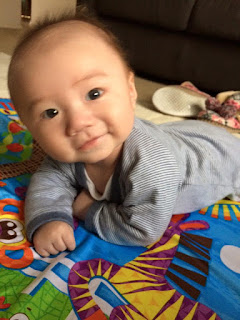Newborns enter the world all curled up and soft with very
little muscle strength and flexibility. As adorable as this stage is, it is vital for the development
of strength, posture, balance, muscle tone, coordination and skull bone
formation that babies have ample freedom of movement and opportunities for
play. Experts find that babies that don’t spend enough waking time on their
tummies can have some delays in their development of motor skills. Tummy time
gives your baby the opportunity to strengthen the muscles they need to prepare
them for rolling, sitting up, crawling and pulling to stand.
**Tummy time as demonstrated by Flynn Foster** Please note that babies should be awake whilst attempting tummy time**
Tummy Time:
Daily tummy time and side lying when your baby is awake is
important to prevent ‘Flat Head Syndrome’ plus provide valuable developmental
benefits for your baby's motor, cognitive and sensory development.
Tips for tummy time:
- Aim for 1-5 minute bursts for newborns then
increase as able.
- Pick a time where they’re awake, content, not
hungry or tired.
- Put your little one at table height, get down
onto a floor playmat or place your baby on your chest.
- Encourage your baby, talk to them, sing to them,
make funny faces etc.
- Use toys, rattles, mirrors and other interesting
items to keep them interested.
- Stop when your baby seems unsettled or
uncomfortable.
Useful links:
Rachel Coley is a pediatric Occupational Therapist whose
website www.candokiddo.com is full of information about your baby's
development. She covers topics such as; developmental milestones, playing with
your baby, tummy time and avoiding a flat head (positional plagiocephaly).
http://www.candokiddo.com/news/2015/1/2/baby-play-activities-for-month-one
http://www.candokiddo.com/news/positionalplagiocephalyflatheadsyndromecosmetic
http://www.candokiddo.com/news/2014/8/17/preventing-flat-head-syndrome








